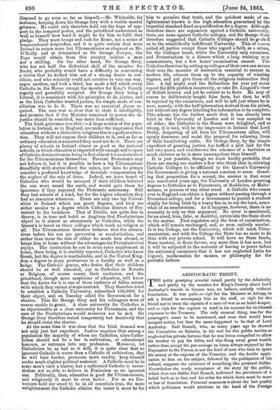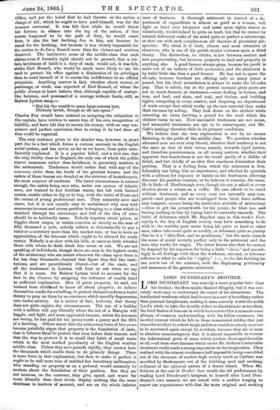ARISTOCRATIC THRIFT.
THE petty gossiping scandal raised partly by the Admiralty I_ and partly by the member for King's County about Lord Amberley's travels in Greece was, we believe, entirely without foundation. It was quite en ligk for the Minister at Atha% to ask a friend to accompany him on his staff, en eagle for the friend not to treat the captain of a man-of-war as an hotel-keeper, and en regle for the captain to send in his account for incidental expenses to the Treasury. The only unusual thing was for the passenger's name to be mentioned, and even that would have escaped notice, but that the name happened to be that of Lord Amberley. Earl Russell, who, as many years ago he showed the Committee on Salaries, in his zeal for 4he' public service so neglected his private fortune that he was twice compelled to allow his brother to pay his debts, and who flung away great wealth rather than accept the per-centage on loans always enjoyed by the Paymaster to the Forces, is not the kind of man who tries to spare his money at the expense of the Treasury, and the double appli- cation to him on the subject, followed by the publication of his refusal, suggests the existence of something like personal dislike. Nevertheless the ready acceptance of the story by the public, which does not dislike Earl Russell, indicated the prevalence of a belief both as to him and his order for which there must be more or less of foundation. Personal meanness is about the last quality which politicians would attribute to the head of the Foreign Office, and yet the belief that he had thrown on the nation a charge of 431., which he ought to have paid himself, was for the moment universal. It was felt that while he would throw his fortune in silence into the lap of the nation, if that course happened to be the path of duty, he would exact from it also the last farthing due to him, not because he cared for the farthing, but because it was clearly impossible for the nation to do for a Russell more than his virtues and services deserved. The instinctive sense of the middle-class that such claims even if formally right should not be pressed, that a cer- tain lavishness of habit is a duty of rank, would not, it was felt, strike Earl Russell, who would be much more likely to use his rank to protect his office against a diminution of its privileges than to avail himself of it to excuse his indifference to an official perquisite. Anything narrow in fact, whether about money, or patronage, or work, was expected of Earl Russell, of whom the public always at heart believe that, although capable of martyr- like heroism, and possessed of a courage without limits, still, as Bulwer Lytton sang,-
- " Not his the wealth to some large natures lent, Divinely lavish, though so oft mis-spent."
Charles Fox would have insisted on accepting the obligation to the captain, have written to assure him of his own recognition of liability, and have left him to mourn his money, with an easy con- science and perfect conviction that in owing it he had done all that could be expected.
The easy credence given to the slander was, however, in great part due to a fact which forms a curious anomaly in the English social system, and has never, so far as we know, been quite satis- factorily explained. It is a popular belief, and a true one, that the only thrifty class in England, the only one of which the public expect meanness rather than lavishness in pecuniary matters, is the aristocratic. Tradesmen would rather deal with any of the nouveaux riches than the heads of the greatest houses, and the cadets of those houses are dreaded as the strictest of housekeepers, the most exigeant of creditors. The latter circumstance is natural enough, the cadets being men who, under our system of inherit- ance, are trained to feel limitless wants, but left with limited means, unable either to dig or to beg, with the tastes of Peers and the means of young professional men. They naturally save and crave, but it is not equally easy to understand why men with enormous incomes and secure position belonging to a class which is Watched through the microscope and full of the idel, of caste should be so habitually mean. Nobody inquires about prices, or higgles about wages, or resists exaction so sternly as the man of fifty thousand a year, nobody refuses so determinedly to pay a tutor or a secretary more than the market rate, or has so keen an appreciation of the discount which ought to be allowed for ready money. Nobody is so slow with his bills, or cares so little whether those with whom he deals think him mean or not. We are not speaking of individuals, though there are men in the highest ranks of the aristocracy who are misers whenever the claim upon them is for less than thousands—beyond that figure they feel like insti- tutions, and are punctiliously liberal—but of the caste, and all the tradesmen in London will bear us out when we say that it is mean. Sir Bulwer Lytton tried to account for the fact in the Cartons by assigning the influence of wealth itself as sufficient explanation. Men of great property, he said, are trained from childhood to know all about property, to believe themselves marks for swindling, to protect themselves from a world thirsty to prey on them by an exactness which speedily degenerates into undue anxiety. As a matter of fact, however, that theory does not quite explain the circumstances. The son of a builder
with a million will pay liberally where the son of a Marquis will haggle, and fight, and seem oppressed because, unless his accounts are wrong, he has paid for his pennyworth a penny and the fifth of a farthing. Others assert that the aristocracy have of late years become painfully avkare that property is the foundation of caste, that it behoves them to protect that even before their honour, and
that the way to protect it is to avoid that habit of small waste which is the most marked peculiarity of the English wealthy
middle class. Unless they save pounds rigidly, they cannot have the thousands which enable them to do princely things. There is some force in that explanation, but then to make it perfect it ought to be still more true of untitled but hereditary millionaires, who standing on property as on a pedestal, would naturally be anxious about the foundation of their position. But they are
men of business. A thorough aristocrat in control of a de- partment of expenditure is almost as good as a woman, will fight as hard over twopence and insist upon rights almost as relentlessly, would indeed be quite as hard, but that he cannot by natural deficiency make of his mind quite so perfect a microscope, or shut out with such completeness all theories of pecuniary per- spective. We think it is Galt, closest and most retentive of observers, who in one of his parish stories ventures upon a third theory. The distinction, he thinks, is not between ancient and new proprietorship, but between property in land and property in anything else. A good farmer always grips, because his profit is made out of an infinity of little economies, and the aristocrat is by habit little else than a good farmer. He has not to spare the oil-cake because butchers are offering only so many pence a pound, but his ideal nevertheless is always to make the oil-cake pay. That is subtle, but at the present moment great peers are not so much farmers as tradesmen,—men dealing in houses, and iron, and lead, and slate, and coal, and timber, and building rights, competing in every market, and despising no department of trade except that which works up the raw material they make their incomes by selling. They look down on the clothier while extorting an extra farthing a pound for the wool which the clothier turns to use. Now successful tradesmen are not mean,. and successful tradesmen are apt to be extravagant, and Mr, Galt's analogy therefore fails in its primary conditions.
We believe that the true explanation is one by no means- flattering to the pride of the middle class. We question whether educated men are ever very liberal, whether their tendency is not the same as that of their wives, namely, towards rigid justice, and therefore penuriousness, in all money matters, whether their- apparent free-handedness is not the result partly of a dislike of detail, and but chiefly of an idea that exactness diminishes their position. That is a feeling from which the aristocrat is free. Liberality can bring him no importance, and whether he quarrels with a cabman for sixpence or insists on his tradesmen allowing discount his position remains, or he believes it remains, the same. He is Duke of Marlborough even though his son is asked at every election about a rebate on a coffin. He can afford to be strict without detriment, and as every man not naturally easy-tem- pered—and people who are worshipped from birth have seldom easy tempers, menace being the instinctive attitude of aristocracy —tries to get his pennyworth for his penny, he tries too, and having nothing to lose by trying hard he naturally succeeds. The habit of deference which Mr. Bagehot says in this week's Fort- nightly is the key of English society may have something to do with it, the wealthy peer never being hit quite so hard as other men, taken into court quite so readily, or informed quite so plainly that he is a " skin-flint, and no gentleman," but the main cause is the sense of social security perfect only in the aristocrat and the- man who works for wages. The latter knows also that he cannot be despised by his superiors for being a little "close," and accord- ingly in all dealings with them the workman, servant, or labourer adheres to what he calls his " rights," i. e., to the last farthing he can screw out of the contract, with the displeasing pertinacity and meanness of the genuine aristocrat.































 Previous page
Previous page